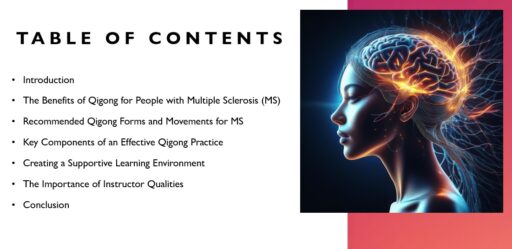Multiple sclerosis (MS) is a chronic neurological disorder affecting nearly 1 million individuals in the U.S., leading to symptoms such as fatigue, muscle weakness, spasticity, cognitive impairment, and emotional challenges like anxiety and depression. These symptoms greatly impact the quality of life, making it essential to explore therapies that can help manage them.
Qigong, an ancient Chinese practice, integrates gentle movements, controlled breathing, and meditation, making it a promising approach for those with MS. According to experts, Qigong offers multiple benefits, including improvements in balance, coordination, muscle strength, and flexibility. The slow, repetitive movements help build muscular endurance and postural control without exhausting the participant, which is particularly important for individuals experiencing chronic fatigue.

A tutorial with details is available for ATCQA Members and Certified Instructors/Practitioners. Other people can purchase the tutorial for a small fee in our online store.
Beyond physical improvements, Qigong’s meditative aspects help regulate the immune system and lower inflammation. Preliminary studies suggest that Qigong may reduce levels of interleukin-6 (IL-6), a marker linked to MS progression. By promoting immune balance, Qigong could potentially slow disease progression and protect the central nervous system (CNS).
Moreover, Qigong’s emphasis on mindfulness and relaxation helps alleviate mental health concerns, offering tools for managing anxiety and depression—common challenges for people with MS. With its holistic focus on body and mind, Qigong is an ideal complementary therapy for improving overall well-being in people with MS.
For an effective practice, individuals with MS can benefit from Qigong forms like the Eight Section Brocade (Ba Duan Jin), gentle rotations, and seated exercises. Success, however, depends on proper instruction, tailored movements, and a supportive, accessible learning environment. By incorporating Qigong into MS care, individuals may find a gentle yet impactful way to manage their symptoms and enhance their quality of life.